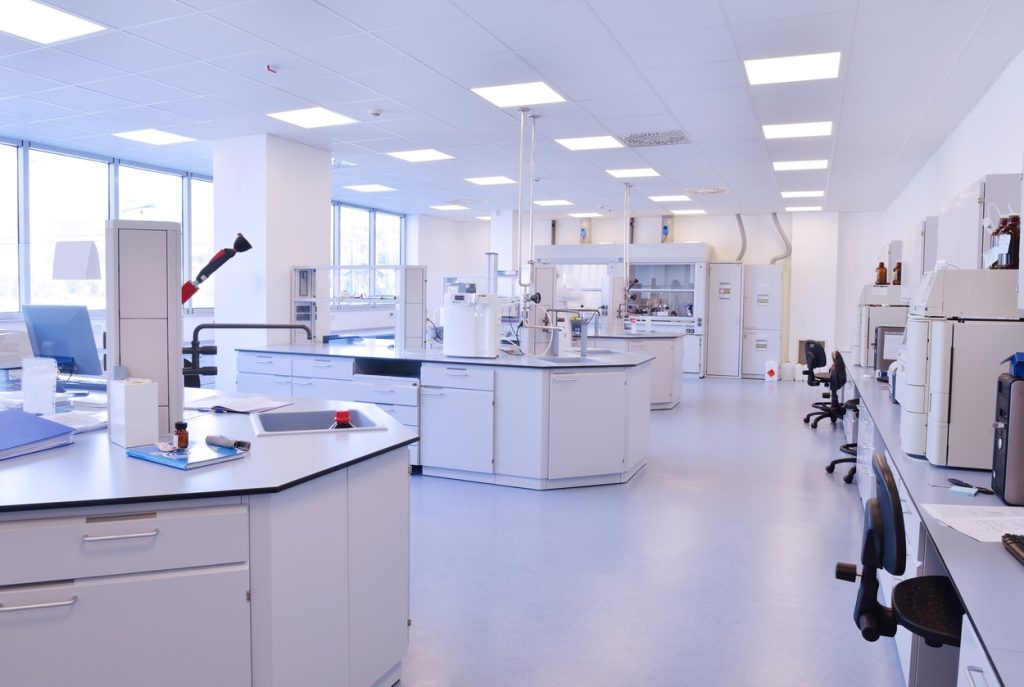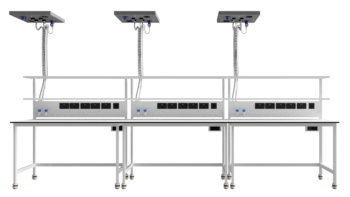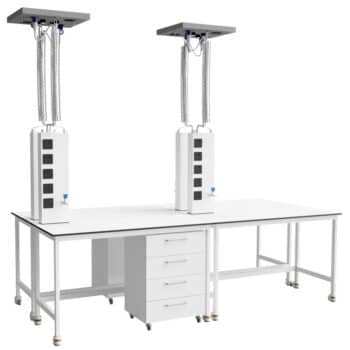The flooring type you choose can depend on certain required factors, including the durability and porosity of the surfaces. Regardless of whether your laboratory specialises in scientific applications or it’s in an educational setting, your flooring type can be a difficult thing to settle on. After all, you want to prioritise both safety and success, while being as cost-effective as possible.
Laboratory flooring can offer many properties, from slip, abrasion and chemical resistance to anti-microbial and bacteriostatic attributes. Such factors become part and parcel of a laboratory’s construction and efficacy.
So, whether you’re renovating or starting from scratch, choosing the right material that’s best suited to your laboratory’s speciality is a hugely important decision. Here, we’ll take a look at the various types of laboratory flooring available and the respective properties of each, alongside their advantages and disadvantages to help make the decision easier for you.
What are some common laboratory flooring properties?
Before we get onto the specifics of certain flooring types, there are some common traits that the majority of lab flooring types feature. These include:
- Durability: Flooring offering hard-wearing protection able to withstand frequent pedestrian and cart traffic
- Slip resistance: Offering an appropriate level of traction for any given area
- Non-porous surface: An impermeable, non-absorbent surface with the ability to withstand exposure to chemicals in the room
- Easy to clean: Low maintenance, with easy and economical cleaning and sanitising properties
Such properties are usually among the minimum characteristics required for research laboratory flooring.
Laboratory flooring and chemical resistance
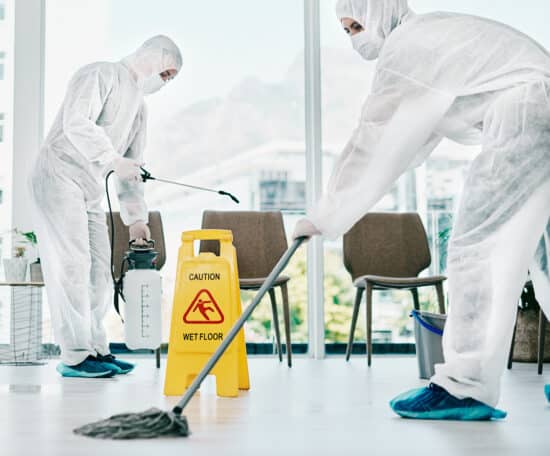
If your laboratory is working with chemicals, then it’s essential to know which materials and chemicals the floor may come into contact with. Although most of this contact will be accidental spillages that are cleaned up immediately, different floor finishes will be more resistant to certain materials and chemicals.
Each product in a range will only be resistant to certain concentrations of a given chemical, so it’s critical to check any available data. If test data shows that the floor can handle low concentrations of a chemical, this doesn’t necessarily mean it’ll be resistant to higher concentrations.
Test data will also specify the length of time that the floor material will be resistant to contact with a given chemical. Some floor finishes have an additional sacrificial layer to protect the floor below from being damaged. However, this will need to be replaced or repaired after contact. Other floor finishes can be resistant to chemicals for long periods of exposure without sustaining any damage at all, and therefore won’t need to be replaced or repaired as often.
Best flooring options for laboratories
Epoxy resin
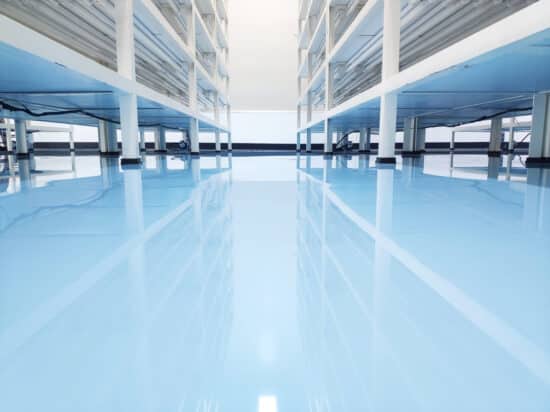
Epoxy resin is the most popular flooring option for laboratories of all types. The flooring is comprised of a combination of materials that, when mixed together, form a chemically hardened plastic-like surface.
Pros: Resin floors provide a durable, safe and flexible walking surface able to hold large amounts of weight without damaging the concrete underneath. They’re also one of the most hygienic and chemical-resistant flooring solutions available. Similar to cleaning kitchen countertops, spills can be easily dealt with without worrying about them settling or sinking below the lab flooring surface. Epoxy resin therefore benefits from high chemical resistance, along with resistance to other hazardous substances.
Cons: Everyday wear and tear can quickly take its toll on resin floors, and they usually need replacing every few years depending on use. Considering this is the most expensive option, this could end up being costly. Similarly, the preparation and application of epoxy onto resin can take a considerable amount of time. The concrete floor underneath must be free of cracks, grease, oil or solvents before the epoxy can be applied. Multiple coats of epoxy are required and since it takes days for a coat to dry, it’s a time-consuming process.
Vinyl flooring
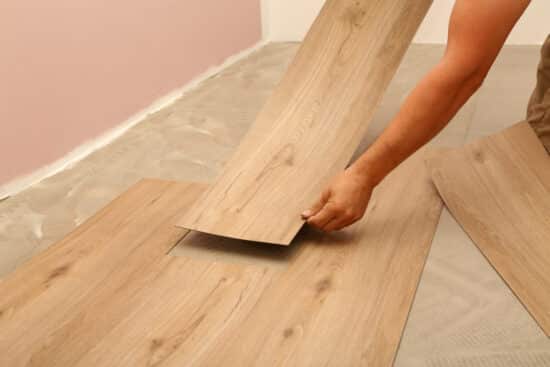
When vinyl flooring is installed in labs, it’s often heat-sealed to create a seamless flooring surface. It’s important to remember that this isn’t the same as the typical vinyl floor in a household kitchen, for example.
Pros: Vinyl flooring is both durable and aesthetically pleasing, which makes it well-suited to laboratories. Though foot traffic may not be excessive, it may see its fair share of rolling trolleys full of heavy machinery, chemicals and samples that require smooth and efficient transportation. It’s also comparatively more sound-absorbent and comfortable underfoot compared to harder floor materials.
It’s also easy to clean and maintain. Depending on the design, any damaged tiles or planks can be replaced with minimal disruption to the productivity of the lab.
Cons: Despite it being easily replaced, vinyl flooring is less cost-effective than other materials due to the high cost of replacements. It’s also non-biodegradable, which can create ecological waste and reduces sustainability. If you’re considering vinyl flooring, you may have to double-check that you’re meeting the environmental building standards of your facility’s building.
Sealed concrete
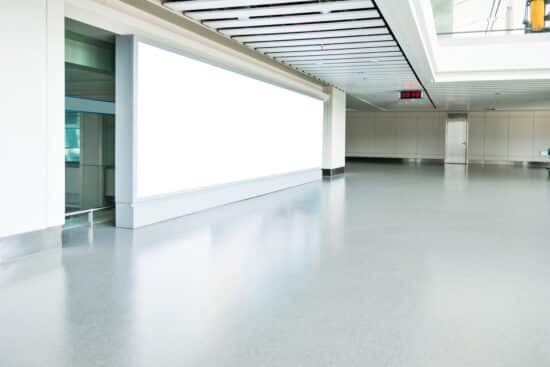
Sealed concrete flooring is usually easy to install when you’re already working with a concrete base. A seal is added over the top to protect it and ensure your flooring can handle the demands of your lab.
Pros: A cheaper alternative to epoxy resin, sealed concrete provides your lab with versatile, durable, easy-to-maintain flooring, which has made it an increasingly popular choice for laboratories. With proper sealing, concrete can last for decades, and doesn’t allow spills or contaminants to escape. Clean-up and maintenance are super easy with this flooring type.
Cons: However, it does have its drawbacks. While its durability can be good, it can also be a liability because if lab members fall or equipment is dropped, they could risk injury or damage. It’s also incredibly slippery when wet, so care must be taken when walking after cleaning. It also has little insulating value and so it can be particularly cold in certain seasons unless installed in conjunction with a radiant floor heating system. Additionally, if it hasn’t been properly sealed, any liquid that’s made its way into the pores of the concrete floor can lead to mould and mildew.
Mezzanine flooring
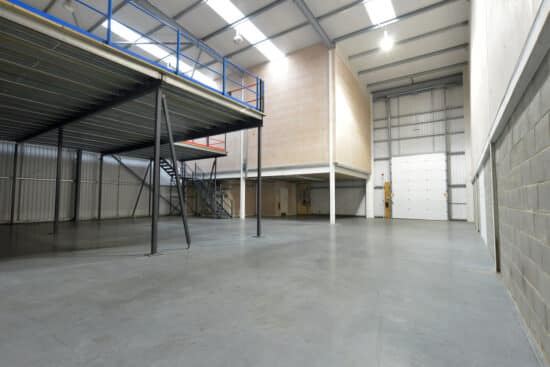
Mezzanine floors are raised platforms constructed between the main floor and the ceiling of a lab. They’re most often installed to maximise smaller spaces.
Pros: Mezzanine flooring is a versatile solutionfor increasing space, flexibility and productivity. The main advantage is that your lab will benefit from additional working space in the raised platform. Whether it’s used for storage or extra workstations, it can help your lab be more organised and productive. Depending on the space you’re working with, this additional flooring can be a considerable addition which can add value to the property.
Cons: While a mezzanine floor can optimise your space, it can also be a hindrance because of big posts and pillars holding up the raised platform. These can be in the way of heavy traffic areas on the ground level and can disrupt workflows. When deciding to install this type of floor, the overall design of your lab may need to be completely reconsidered.
Monolithic flooring
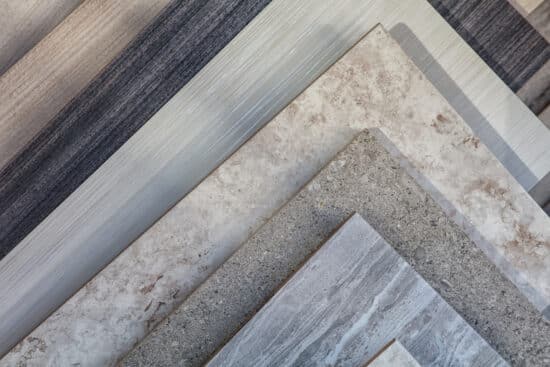
Consisting of large sheets of flooring that can be chemically bonded, or heat welded together, monolithic flooring is typically constructed of vinyl, rubber or linoleum.
Pros: These are a great option for labs looking for a more economical approach to their flooring since it offers a less costly variation. Once properly sealed, monolithic floors create a seamless cove that continues up the wall by a few inches, eliminating the possibility of liquid or chemicals reaching below the surface and causing damage.
Cons: It’s crucial that monolithic flooring is properly installed and sealed. If not, then excessive water or chemical spillage can penetrate and damage certain floor types.
Enjoyed this article? There’s plenty more to be found over on the InterFocus blog. Looking for information about our bespoke turnkey solutions? Visit our homepage or call the team on 01223 894 833.
